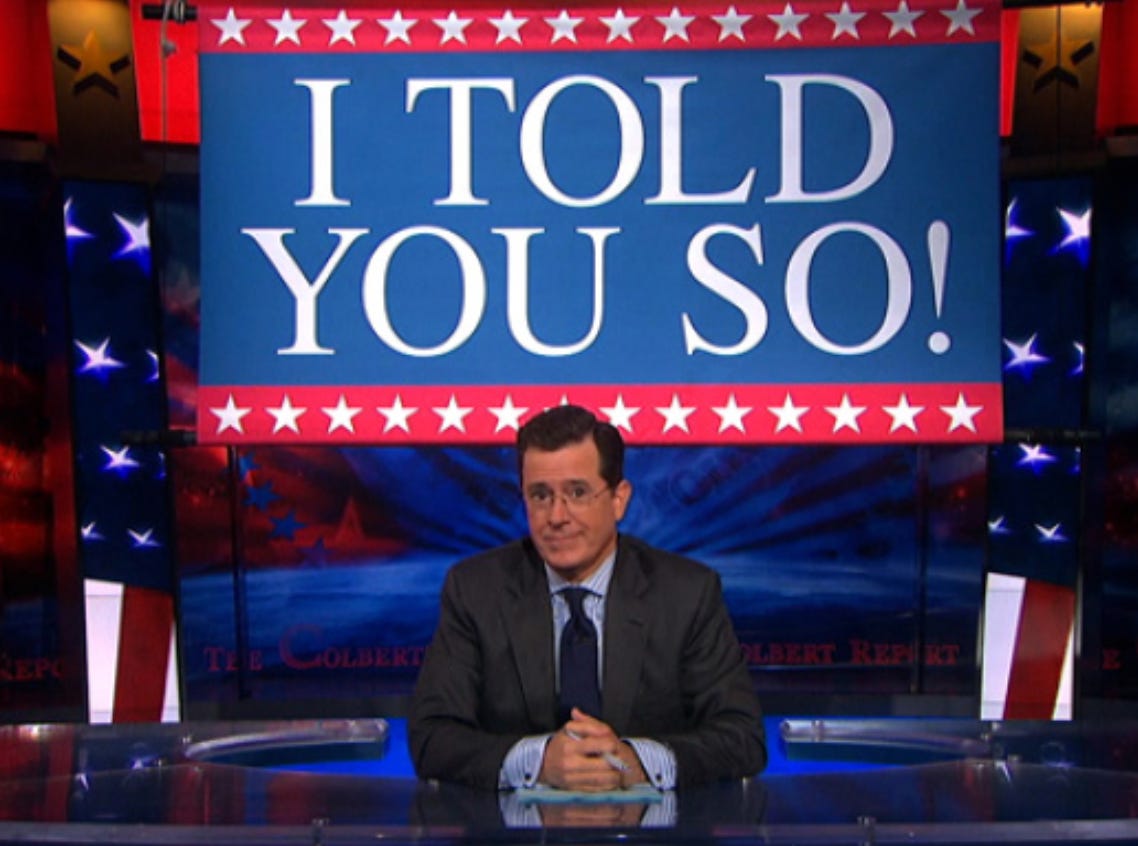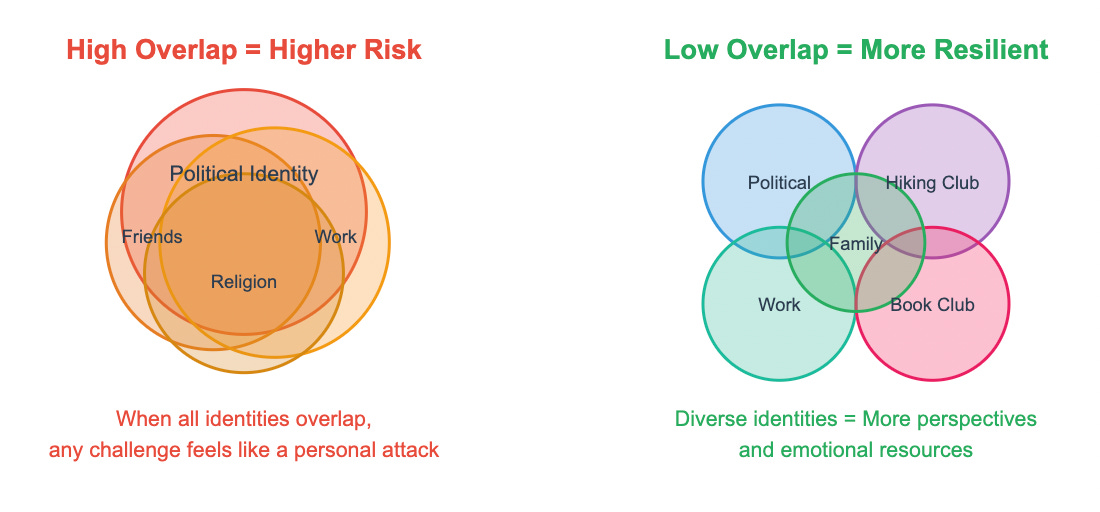How to Combat Misinformation: A Practical Guide
What Misinformation Researcher Matthew Facciani taught us about media literacy
Hey friends! One of our favorite podcast episodes we have done dropped this week! After our incredible conversation with
about misinformation, we wanted to distill his research-backed strategies into a practical guide.Combating misinformation isn't about becoming the truth police or memorizing fact-checking websites. It's about understanding our own psychology and building better habits.
The Big Reframe: It's Not About Being Right
First, let's get something straight. Matthew said that we're ALL vulnerable to misinformation. Yes, even you. Even me. Even that friend who thinks they're immune.
The goal isn't to achieve some perfect state of always knowing what's true. It's about building resilience against the psychological tricks that make us believe things that aren't backed by evidence.
Your Misinformation Defense System
1. The Emotion Check
Remember when Matthew said emotion spreads faster on social media? Here's your new superpower:
When you read something that makes you REALLY angry or REALLY excited:
Stop scrolling
Ask yourself: "How is this making me feel?"
Remember: People literally make money by making you mad
If you're furious, that's your cue to dig deeper before sharing
2. The One-Person Rule
This blew our minds: Having just ONE person in your life who thinks differently politically makes you far less likely to believe political misinformation.
Action step: Don't necessarily not speak to your neighbor who has different politics. Instead:
Keep those relationships (within reason - we're not talking about tolerating abuse)
Practice actually listening without trying to convert them
Use it as information into how other people see the world
Sometimes that different perspective can actually calm your catastrophizing instead of making it worse.
3. Diversify Your Identity Portfolio
Matthew's concept of "social identity complexity" is genius. Basically, if all your identities overlap (your politics = your religion = your friend group = your job), you're super vulnerable to misinformation.
Try this exercise:
Draw a map of your identities (parent, professional, hobby enthusiast, etc.)
See how much they overlap
Actively cultivate identities that DON'T overlap with your political/religious views
Join that book club, mommy and me get together or hiking group
4. Pre-Bunking > Debunking
Instead of playing whack-a-mole with false claims, learn to recognize manipulation techniques:
Red flags to watch for:
"They don't want you to know this!" (forbidden knowledge framing)
Extreme emotional language
Claims that explain complex events with simple villains
"Could have said it" logic ("Well, even if they didn't say it, they probably think it")
5. Upgrade Your Media Diet
Matthew's approach? Boring news first, spicy takes second.
His go-to sources for facts:
Reuters
Associated Press
NPR
Then explore different perspectives, but start with the plain facts. It's like eating your vegetables before dessert. I also recently discovered an app called Ground News that I am obsessed with. It shows which articles are being more covered on the right versus the left.
The Community Approach
Find Your Third Spaces
Remember: We've lost the muscle for dealing with different viewpoints because we don't practice anymore. The solution? Get out there and practice.
Low-stakes ways to start:
Local sports leagues
Community volunteering
Hobby groups
Neighborhood events
The key: These should be activities where politics isn't the point. You're there to bowl, not debate.
Change Your Conversation Goals
Stop trying to change minds. Seriously. Matthew was clear: The goal is reducing psychological barriers so your perspective can at least be heard.
Better conversation strategies:
Lead with shared interests
Find common ground before diving into differences
Ask genuine questions (not gotcha questions)
Share your own uncertainty and questions
The Hard Truth: This Stuff Is Painful (And That's Okay)
A lot of these suggestions are really uncomfortable and I want to acknowledge that. Even when we were having the conversation with Matthew, I felt myself squirming in my chair. My body felt like it was rejecting this conversation. So if you’re feeling this as you read, I get it.
When you first expose yourself to different viewpoints, you might feel:
Physically tense (I absolutely feel it in my body)
Defensive
Like your whole identity is under attack
Exhausted from the mental gymnastics
Angry that you even have to do this work
Here's what we need you to know: This discomfort doesn't mean you're doing it wrong. It means you're doing it RIGHT.
When you feel that resistance to different ideas, that's your mental flexibility growing. You're not becoming weaker or "giving in". You're becoming intellectually stronger.
What actually happens when you practice this:
Your own beliefs get clearer and more refined
You develop better arguments for what you believe
You become less reactive and more confident
You can spot the weak points in your own thinking
You become harder to manipulate
As Matthew pointed out — when you only hang out with people who agree with you, you never stress-test your ideas. It's like only practicing basketball with people shorter than you. You'll feel great until you play against real competition.
And honestly in this day and age, as we are trying to make a difference and fight for a better future, we need to be strong in our beliefs. Or at least that’s what I tell myself when I’m feeling resistant to this work.
The Mindset Shifts That Matter
From "I'm Not in an Echo Chamber" to "How Can I Expand My Chamber?"
Everyone thinks their echo chamber is just "the truth." But moral purity and surrounding yourself only with people who agree - actually makes you MORE susceptible to misinformation, not less.
From "They're Evil" to "They Have Different Information"
When someone believes something wild, ask: What information ecosystem are they in? What social needs is this belief meeting? Understanding doesn't mean agreeing.
From "That's Obviously Fake" to "Why Do People Find This Compelling?"
Instead of dismissing people as stupid, get curious about the appeal. What need is this misinformation meeting?
When Your Nervous System Says "Nope"
Let's talk about something Matthew didn't cover but we see all the time as therapists: Sometimes the news literally triggers your trauma response. Your heart races, you dissociate, you feel that familiar panic rising.
This is your permission slip to:
Close the app
Take news breaks
Use the "mute" function liberally during triggering news cycles
Set actual timers for news consumption (start with 10 minutes)
Quick anxiety management for news consumption:
Before opening news: Take 3 deep breaths, plant your feet on the floor
While reading: Notice your body. Jaw clenched? Shoulders at your ears? That's your cue to pause
After consuming: Do something physical - walk, stretch, shake it out
The difference between informed and overwhelmed:
Informed: You know the key facts and can take meaningful action
Overwhelmed: You know every horrible detail and feel paralyzed
Remember: Protecting your mental health isn't "sticking your head in the sand." You can't help anyone if you're in a constant state of panic. Sometimes the most radical thing you can do is recognize when you need to step back and regulate.
The Bottom Line
Fighting misinformation isn't about being smarter than everyone else or having the perfect fact-checking system. It's about: understanding your own biases, developing media literacy habits and staying curious instead of certain.
As Matthew said, we can't fact-check our way out of this. But we CAN build resilience, one conversation and one community connection at a time. This isn't about perfection. It's about progress. And that gives me hope.
What strategies resonated most with you? Have you tried any of these approaches? Drop us a comment and let us know what you're learning about your own information consumption habits.
And if you found this helpful, you'll love Matthew's upcoming book "Misguided" and his
on Substack.







This was a really interesting episode to listen to! I’ve listened to it twice and am thinking about incorporating this episode as a reflection assignment at the end of my persuasive unit since it touches on a lot of things we cover in class.
One additional thought on the political purity section of this episode (and I’m going to tangent into persuasive theory for a second): Within persuasive theory, beliefs and values are distinctly separate from one another. Beliefs are categorized as objective ideas that people have learned to accept as plausible based on interpretation and judgement (for example, water is wet) and values shape our own subjective ideology that informs how we view questions of morality with ourselves and others. I remind my students all the time that what commonly gets referred to as religious ‘beliefs’ are actually values. And over the last 5-ish years political ‘beliefs’ have made the same shift. Of the four persuasive goals (eliciting change in an attitude, behavior, belief, or value), eliciting change in a value is the most difficult because of the amount of cognitive dissonance someone experiences when how they perceive themself and the morality of their own internal compass starts to get rattled. This is why eliciting change in a value requires multiple conversations over an extended period of time. I completely agree that overlapping identities and a sense of community belonging contribute to the rigid, white knuckling we see with political dogma now - and every time we attempt to have a one-off conversation with someone about a political topic as though we’re discussing, or debating, an attitude or belief when we’re actually walking into a conversation about values, it backfires in a way that causes both sides to become more entrenched in their original value system and less receptive to other perspectives.